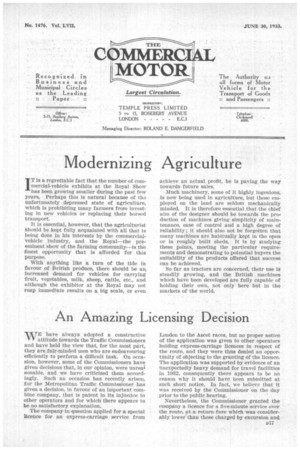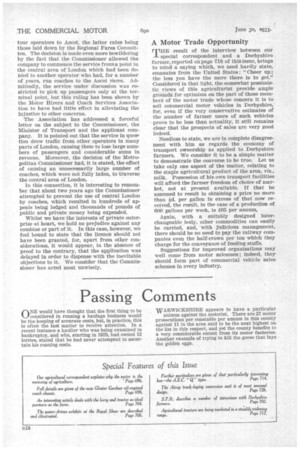An Amazing Licensing Decision
Page 67

Page 68

If you've noticed an error in this article please click here to report it so we can fix it.
VjE have always adopted a constructive attitude towards the Traffic Commissioners and have held the view that, for the most part, they are_fair-minded men who are endeavouring efficiently to perform a difficult task. On occasion, however, some of the Commissioners have given decisions that, in our opinion, were unreai sonable, and we have criticized them accordingly. Such an occasion has recently arisen, for the Metropolitan Traffic Commissioner has given a decision, in favour of an important combine company, that is patent in its injustice to other operators and for which there appears to be no satisfactory explanation.
The company In question applied for a special Licence for an express-carriage service from London to the Ascot races, but no proper notice of the application was given to other operators holding express-carriage licences in respect of the route, and they were thus denied an opportunity of objecting to the granting of the licence. The application was supported by evidence of an Unexpectedly heavy demand for travel facilities in 1932, consequently there appears to be no reason why it should have been submitted at such short notice. In fact, we believe that it was received by the Commissioner on the day prior to the public hearing.
Nevertheless, the Commissioner granted the company a licence for a five-minute service over the route, at a return fare which was considerably lower* than those charged by excursion and tour operators to Ascot, the latter rates being those laid down by the Regional Fares Committee. The decision is made even more bewildering by the fact that the Commissioner allowed the company to commence the service frornt a point in the central area of London which had been denied to another operator who had, for a number of years, run coaches to the Ascot races. Admittedly, the service under discussion was restricted to pick up passengers only at the terminal point, but this ruling has been shown by the Motor Hirers and Coach Services Association to have had little effect in alleviating the injustice to other concerns.
The Association has addressed a forceful letter on the subject to the Commissioner, the Minister of Transport and the applicant company. It is pointed out that the service in question drew traffic from other operators in many parts of London, causing them to lose large numbers of passengers and considerable sums in revenue. Moreover, the decision of the Metropolitan Commissioner had, it is stated, the effect of causing an unnecessarily large number of coaches, which were not fully laden, to traverse the central area of London.
In this connection, it is interesting to remember that about two years ago the Commissioner attempted to prevent the use of central London by coaches, which resulted in hundreds of appeals being lodged and thousands of pounds of public and private money being expended.
Whilst we have the interests of private enterprise at heart, we hold no prejudice against any combine or part of it. In this case, however, we feel bound to state that the licence should not have been granted, for, apart from other considerations, it would appear, in the absence of proof to the contrary, that the application was delayed in order to dispense with the inevitable objections to it. We consider that the Commissioner has acted most unwisely.
A Motor Trade Opportunity
THE result of the interview between our special correspondent and a Derbyshire farmer, reported on page 718 of this issue, brings to mind a saying which, we need hardly state, emanates from the United States : "Cheer up ; the less you have the more there is to get." Considered in that light, the somewhat pessimistic views of this agriculturist provide ample grounds for optimism on the part of those rnemberg of the motor trade whose concern it is to sell commercial motor vehicles in Derbyshire, for, even if the very conservative estimates of the number of farmer users of such vehicles prove to be less than actuality, it still remains clear that the prospects of sales are very good Indeed.
Needless to state, we are in complete disagreement with him as regards the economy of transport ownership as applied to Derbyshire farmers. We consider it to be a simple matter to demonstrate the converse to be true. Let us take only one aspect of the matter, relating to the staple agricultural product of the area, viz., milk. Possession of his own transport facilities will afford the farmer freedom of choice of market, not at present available. If that be assumed to result in obtaining a price no more than /d. per gallon in excess of that now received, the result, in the case of a production of 600 gallons per week, is £65 per annum, Again, with a suitably designed interchangeable body, other commodities can easily be carried, and, with judicious management, there should be no need to pay the railway companies even the half-crown per ton which they charge for the conveyance of feeding stuffs.
Suggestions for improved organizations may well come from motor salesmen ; indeed, they should form part of commercial vehicle sales schemes in every industry.




















































































































































